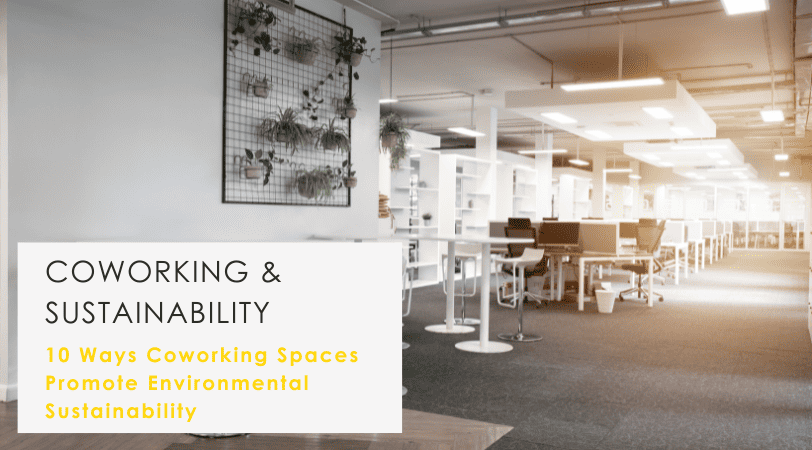In the world we live in, climate change concerns are the new normal. Not just businesses are grappling with cost efficiency, and coworking spaces are the place that ticks all the boxes—be it saving the planet and money. Such dynamic work environments can bring in more than just flexible desks and strong Wi-Fi, but symbolize a techtonic shift towards sustainable and value-based practices. In this blog, let’s take a closer look at how environmentally friendly coworking spaces shape a better future for both people and the planet.
Lowering Carbon Emissions and Pollution
Consider the thousands of professionals who commute long distances daily by personal vehicles, all to attend their standard “office.” Now, consider the alternative: the same employees walking or biking from their homes to a neighborhood coworking hub.
Coworking hubs significantly limit long commutes, particularly in urban and semi-urban settings. When professionals begin to pick local coworking communities over urban centers, it means:
- Fewer cars on the road
- Less fuel consumption and carbon emissions
- Lesser air pollutants and significantly better AQIs
While this is beneficial for the lungs of our cities, it is also helpful for the planet. A report by the Carbon Trust found that coworking setups can significantly reduce the carbon footprint of each worker by up to 35%, compared to traditional spaces.
A Less Wasteful Approach to Resource Management
Traditional offices often generate repeat waste, including ink cartridges, coffee machines, office supplies, and numerous single-use plastic packages. Coworking spaces are based on the more sustainable concept of shared consumption—whether it be workspace or materials.
Coworking spaces typically have:
- Centralized printing stations
- Kitchenware, not single-use plastic
- Recycling and composting solutions
These practices collectively help in reducing e-waste, packaging waste, and unnecessary consumption, giving coworking spaces a low-waste edge over their traditional counterparts.
Supporting Local Businesses
Coworking spaces are not isolated corporate towers. They’re usually nestled within neighborhoods, surrounded by cafes, gyms, retail shops, and food joints. This proximity naturally fuels the local economy.
Workers at these spaces often step out for:
- Coffee runs
- Lunch breaks
- Team outings
- Personal errands
This steady stream of foot traffic provides a reliable income source for small and local businesses, keeping the local economy vibrant and self-sustaining. Some coworking operators, like Zioks, even partner with local food and catering vendors to offer discounts and perks to members, further boosting community commerce.
Promoting the Sharing of Resources
The essence of coworking revolves around sharing, not only space. Members also share:
- Meeting rooms
- Internet services
- Equipment
- Event facilities
- Utilities
This eliminates the need for every individual or startup to invest in a costly setup, which they would have to maintain on their own. It also reduces idle resource waste, such as the air conditioning of unoccupied offices or the lighting of unoccupied offices. The outcome is a much more efficient and intelligent use of limited natural and manmade resources.
Energy Efficiency by Design
Many new coworking spaces are constructed, as well as retrofitted, with energy-efficient materials and green certifications in mind. This includes:
- Smart lighting systems
- Solar panels
- Energy-saving HVAC systems
- Motion sensors for lights and devices
- Abundant natural lighting and ventilation
As a rule, coworking spaces endorse the ‘do more with less’ approach, which is a cornerstone of sustainable development.
Meeting Workers’ Needs Through Flexibility
The agility offered by coworking spaces is one major economic advantage. Given today’s world, full of uncertainties such as pandemics, economic shifts, and changing work patterns, coworking spaces offer what traditional leases cannot: flexibility.
Startups, freelancers, remote workers, and even large enterprises can:
- Scale up or down as needed.
- Rent desks or rooms by the hour, day, or month
- Avoid long-term leases and overhead costs
This reduces financial strain and enables businesses to test ideas, grow strategically, and cut losses quickly when needed. Environmentally, this also means fewer unused or abandoned office spaces.
Affordability for All
Let’s face it: setting up a traditional office isn’t cheap.
From furniture and tech to cleaning staff and internet setup, it’s a significant investment, often out of reach for freelancers, creatives, and early-stage startups. Coworking spaces lower this barrier significantly. For a small monthly fee, members get access to:
- Furnished office setups
- High-speed internet
- Printing and scanning
- Meeting rooms
- Free coffee (the true fuel of productivity!)
This democratizes access to professional workspaces, especially for underrepresented entrepreneurs, students, and remote workers who might otherwise be confined to noisy cafes or cramped bedrooms.
Wider Economic Benefit: Building a Freelance and Startup Ecosystem
The positive impact of coworking extends well beyond its physical spaces.
By supporting remote workers, freelancers, digital nomads, and startups, coworking spaces create a fertile environment for entrepreneurship and job growth. These spaces encourage:
- Collaboration and networking
- Peer learning and mentorship
- Access to events, pitch nights, and skill-building sessions
Many small businesses that begin in coworking spaces grow into successful companies, hiring locally, investing back in the community, and contributing to the tax base. Cities that promote coworking see noticeable increases in economic mobility, tech innovation, and freelancer retention.
Bringing It All Together
Coworking spaces are more than just a workplace trend; they are a thoughtful response to our changing world. They combine sustainability with affordability, productivity with flexibility, and community with efficiency.
By cutting emissions, waste, and energy use while empowering professionals and supporting local economies, coworking is paving the way for a greener, more resilient future of work.
So, the next time you look for a coworking space in Kolkata, remember that you’re not just booking a desk. You’re choosing a workspace that supports your goals, respects your budget, nurtures your mental health, and—most importantly—protects our planet. Choose wisely and make a positive impact!


